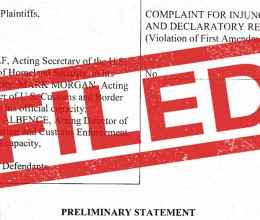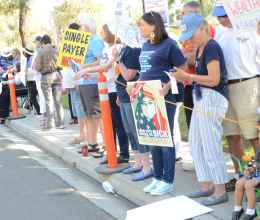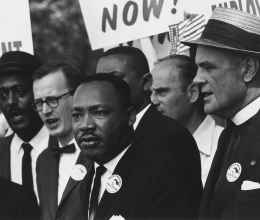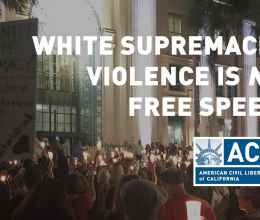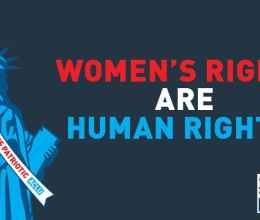SAN DIEGO - Citing viewpoint discrimination as “an egregious form of content discrimination,” the San Diego ACLU called on the Encinitas City Council to stop enforcing and amend an unconstitutional ordinance that restricts the right to post political signs on private property. By exempting religious symbols and governmental flags but not political signs, the ordinance discriminates based on the content or viewpoint of the message expressed—a core First Amendment violation. The ordinance also violates residents’ right to engage in political speech—which is afforded the highest degree of First Amendment protection—by excessively curtailing how many campaign signs can be posted and for how long.
“When the government regulates what viewpoints people can express and when, we’re getting deep into Orwellian territory, no matter how benign the intent,” said David Loy, legal director of the ACLU of San Diego & Imperial Counties. “The city has no right to favor some kinds of speech but not others. The First Amendment means nothing if it does not protect an open exchange of ideas, whether on our front lawns or in our public squares.”
By favoring “government flags” over all other flags and signs, the city is unconstitutionally differentiating between speech based on its content. And by allowing an unlimited number of religious symbols of any size, but restricting the number and size of nonreligious signs, the ordinance favors religious over nonreligious speech, regardless of the purpose for doing so. The First Amendment’s Establishment Clause compels the government to seek neutrality towards religion—neither favoring one religion over another nor those who have a religious viewpoint over nonadherents. The ACLU calls on the city to revise its sign ordinance to make sure that its regulations neither favor nor inhibit religious speech.
Another constitutional concern is the ordinance’s time-based and numerical restrictions on political signs, restricting displays to only the thirty days before an election and three days afterward, and for the remainder of the year allowing only two temporary signs, political or otherwise. The Supreme Court has endorsed residential signs as “a venerable means of communication that is both unique and important,” and courts have consistently found these kinds of restrictions to be unconstitutional.
“We look forward to the day when city officials will be championing the public’s role in creating a diverse marketplace of ideas,” said Loy. “This is well-established law, and we are long past the point where a city should be wasting time and money to restrict free speech.” In the ACLU’s demand letter to the city council, Loy respectfully requested an immediate end to enforcement of the ordinance and commencement of the process to amend it as necessary to comply with the First Amendment. “As in every case, I hope to resolve this matter without litigation, but I am prepared to litigate whenever necessary to defend the First Amendment,” Loy said in the letter.
# # #


